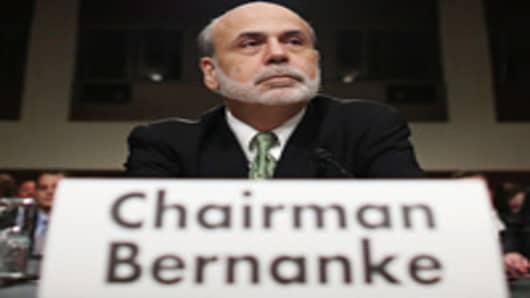Federal Reserve Chairman Bernanke traveled to Capitol Hill this morning for his periodic appearance before the Joint Economic Committee of Congress.
He delivered a careful and balanced view of the economy (a gradual healing in the context of a still-muted outlook growth and jobs), re-iterated the improved banking and financial conditions at home (stressing the major additions to bank capital), and referred to the strains in Europe (acknowledging that they act as a drag on the US economy).
The most interesting aspect related to policy.
Specifically:
1. Certainly in his written submission, but also in the oral responses to questions, Bernanke is trying hard to shift the focus from monetary policy to other areas (particularly fiscal). This speaks to his lack of specificity on future monetary policy actions and to his comment that he would feel much more comfortable if Congress were to take some of the policy burden off the Fed.
2. If this interpretation is correct, Bernanke is following the example of Mario Draghi, the president of European Central Bank . Draghi has been unusually vocal in recent weeks about the need for politicians in Europe to step up to the plate and deliver on their policy responsibilities; and he has been clear about the risk that relying just on the ECB may, in my words, again end up providing a bridge to nowhere.
3. This is all consistent with the growing view in both academic and policy circles that unusual central bank activism is becoming less effective overall. Indeed, Bernanke referred to this in the Q and A. And this relates to both lower expected benefits and the risk of greater collateral damage and unintended consequences.
4. Central bankers are becoming more nuanced and thus differentiating between the trio of policy willingness, ability and effectiveness. They are telling us that they are willing to do more if conditions deteriorate; the ability is there though impacted by imperfect policy instruments; and effectiveness is not what it used to be.
5. There is a risk that central bankers may be ahead of some markets are at this stage. And to reinforce this, just witness the reaction to the announcement out of China earlier today regarding monetary policy changes there.
With an understandable short-term mentality dominating—after all, so many macro factors are in flux these days (economic, financial and political) and thus an "unusually uncertain" outlook— we should expect markets to continue to bundle what central bankers and others feel should be more differentiated. The likely upshot is continued volatility underpinned by alternating periods of risk-on and risk-off.
Mohamed El-Erian is the CEO and Co-CIO of PIMCO, which oversees nearly $1.8 trillion in assets and runs the Pimco Total Return Fund, the largest bond fund in the world. His book, "When Markets Collide," was a New York Times and Wall Street Journal bestseller, won the Financial Times/Goldman Sachs 2008 Business Book of the Year and was named a book of the year by The Economist and one of the best business books of all time by the Independent (UK).



